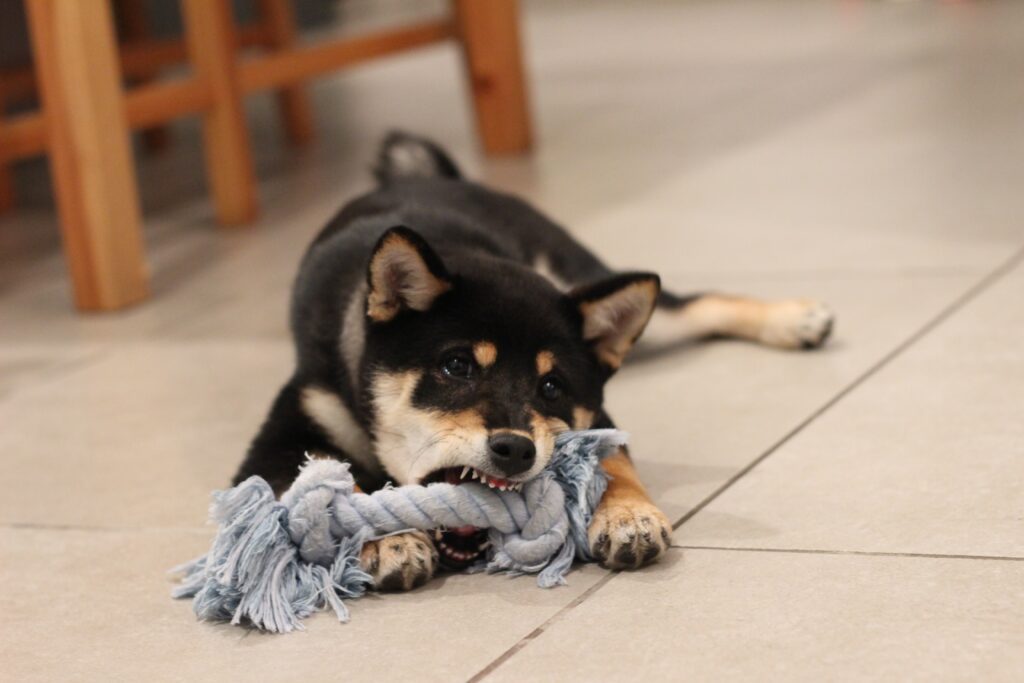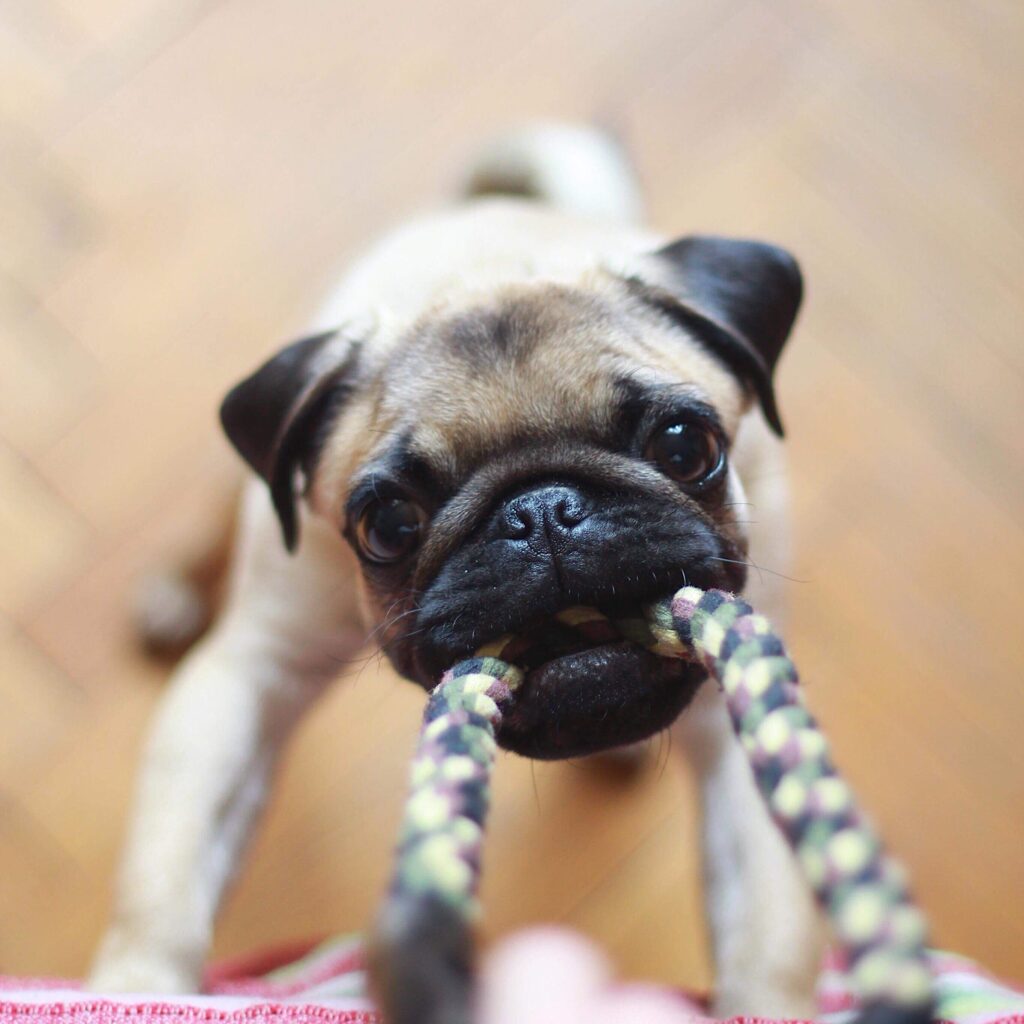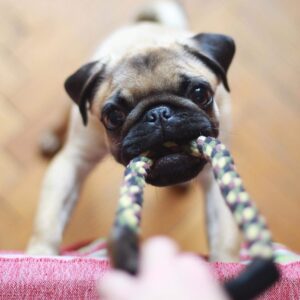Need help with Reactive Dog Behaviour? Join my FREE Facebook support group...
Is extreme dog mouthing normal?
Extreme mouthing is no joke. If you have a dog that is mouthing on you, you’ll know how powerless you feel to stop it – and how sore it can get! So, is extreme dog mouthing normal, and if it is, why do they do it?
If you do a quick google you’ll find the number one piece of advice is to just ignore it! That’s easier said than done, and is rarely effective on it’s own anyway!
The problem is that there are actually quite a few different reasons dogs mouth their owners. In fact I came up with 10 main ones. I’ll talk about each one in more detail below. But once you know why your dog is doing it, you’ll have a place to start when it comes to solving it.
1. Your pup hasn’t learned bite inhibition
This often happens when a puppy is taken away from his littermates too early. The guideline to bring a puppy home is 8 weeks. But that doesn’t work for every puppy.
During these early weeks of life, the pups will bite down on each other routinely. The reaction they get from their siblings tells them so much about how much pressure to use when they play, hunt or fight. If they don’t have access to this early learning they will constantly get it wrong and it will be up to you to teach them!
This type of mouthing will be most obvious during play. Everyone is at risk whether they are family, visitors, other dogs, or other pets!
2. Frustration
As your dog grows up he’ll start wanting to make his own rules and get his own way. When things don’t go his way he’ll get frustrated and could start acting up. This can be driven by hormones as your pup becomes a teenager, but it can also come as a result of a pup being taken away from their mum too soon. You might not pick your pup up until they are 8 weeks old, but it doesn’t mean they were with their mum until then.
Some breeders remove the mum as soon as her pups can feed themselves. Unfortunately, there is still so much they still need to learn from her. If she is taken away too soon they miss out on her guidance and discipline. This happens a lot and I can spot a it a mile away – if your young pup is mouthing out of frustration, this could be why.
This type of mouthing will feel very targeted and might only happen to one or two members of the family. Being firm (but kind) and consistent with rules and boundaries, at all times, is the way forward with this pup.

3. Teething
Puppies mouth everything when they are teething. Just like a toddler; they can experience significant pain as their adult teeth start moving and pushing through. You’ll know it’s teething as they’ll be looking for anything they can sink their teeth into. They’ll gnaw on you, your shoes, the furniture, their lead, and everything else. This type of mouthing is purely for the purpose of relieving pain. So, the best way to handle it is to provide plenty of appropriate chews, and redirect to those as much as possible.
4. Attention Seeking
Attention seeking is a very common cause of extreme dog mouthing. If you are living with an extreme mouther you’ll know how hard it is to ignore. So from the dogs point of view, it’s very effective. If this is your problem, he’ll have other tricks to get your attention too. You’ll have to identify them and work on those at the same time as working on the mouthing. If you don’t, the results will feel short lived and lack consistency.
5. Rough Play
Some dogs just love to play rough. Bully breeds particularly love it, but it’s certainly not limited to those. This is a part of who they are so you can’t just train them to “play nice”. Instead, find an outlet for it.
Finding groups of dogs that also love a good wrestle is the best way. In the mean time, don’t engage in any games that encourage biting. If he’s getting his fix elsewhere, he’ll be much happier to settle for calmer games with you.
6. Over Excitement
Over excitement is the cause of so many behavioural problems, and not just extreme mouthing. If this is the problem, your dog will only do it when he’s over excited. For example, when you come home from work or when people get them riled up. Homes with young children often suffer with this problem as the kids run and play in an excited way. Excitement is infectious and dogs often can’t help get carried away. When it all goes wrong kids often squeal and this just adds fuel to an already bad situation. Once dogs are over excited they switch their brains off, and this is where the problem starts.
In the first instance, you must stop getting them over excited to prevent this kind of mouthing. Then look for calm ways to interact and play with them.

7. He’s Over Tired
Dogs need around 16-18 hours of sleep a day (depending on age) to properly function. Without it he can become grumpy, reactive, and he’ll make poor decisions. This could lead to play getting out of hand, but it could also lead to him being more demanding in general, and short of patience.
As well as a lack of sleep, he might be over tired from receiving too much exercise. This is not uncommon in younger dogs, especially as their training starts allowing them to get off lead and play with other dogs. But they’re still growing, and their bodies can’t handle lots of exercise as well as an adults can.
Incidentally, a lack of sleep can also affect the way their bodies are repaired and grow. So a double whammy if they are over exercised, and lack sleep.
In either case, it’ll feel similar to the extreme mouthing caused by frustration. It might be harder to spot the trigger, and in some cases, it might even appear to be over nothing.
8. Too much energy
Just like he can have too little energy, he can also have too much. Too much energy will force him to find an outlet to use some of it up. Very young puppies might have this problem as they are often on restricted exercise due to vaccination status, or to protect their growing bones. If this is a problem, they’ll be other signs such as an inability to rest, frequent “zoomies”, and being relentlessly playful.
This should be a relatively simple fix – just use up all that energy! If a simple walk won’t do it, then why not join a club such as agility or flyball (if they are old enough) or take them to places where it is safe to let dogs off lead to mix and play with other dogs. A professional dog walker could help out, or you could also sign your dog up for day care.
But, just quickly… before you start running his legs off! Do a quick check on his food and portion sizes. These tend to creep up over time, so it never hurts to check it. And while you are there, take a look at the quality of the food too. Some foods contain less of the good stuff than others. Just like kids can be bonkers on sugar, some dog foods have the same effect on our pups!
9. Needs more stimulation
Mental stimulation comes as standard when you are a puppy as everything is new and exciting. Plus, you are still enthusiastic about training and they are learning fast. This effect often wears off at around 5 months of age. When it does, some dogs start to get bored and look for an outlet for their boredom. This dog might appear naughty in general and constantly looking for trouble!
Find ways to stimulate their brain by joining a more advanced class, taking up scent work, introducing puzzles or anything you can think of that will keep his brain busy!
10. Hormones
As your dog grows into a teenager; hormones often take charge and can cause any number of problems. Teenagers are supposed to challenge the world around them and rebel against rules, that’s their job. This does mean they can get easily frustrated. This is just a phase. But if he get’s away with it too often, it will become a habit that will continue long after the hormones have settled.
You’ll know if this is the problem as it will feel like the trigger changes regularly, and his behaviour will lack consistency.
It might also be the case that he had a mouthing issue as a pup which you thought was solved! Hormones can re-ignite old problems, but you’re not starting from scratch, far from it. You’ve solved the problem before, you can do it again.
All of the above!
If you have identified a few possible causes of your dogs extreme mouthing, that’s quite normal. It is an extremely effective behaviour as we just can’t ignore it. So, when it works in one regard, it probably won’t be long before it is tried in another.
So, is extreme dog mouthing normal?
In short, yes it is, but that doesn’t mean you have to put up with it. Once you know what’s causing your dog to do it you can figure out a plan to stop it. Start by addressing the cause of the problem and make sure his efforts don’t pay off. Then ignore, ignore, ignore!
How can I help you with your dogs behaviour training?
Private Dog Behaviour Consultations are currently available in the Dundee area and beyond. If you are looking for help solving your dogs behaviour and training problems, then please get in touch!


